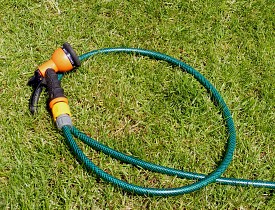Spring Cleaning for Lazy Folks
 Are you sickened by commercials of proud homemakers and their immeasurable satisfaction at the sight of a clean window? Do you resent suggestions to, “Get ready for spring cleaning!” when there’s still snow on the ground? Have you suspected that the very notion of an annual cleaning event could be the seed of a global takeover by the city council of Stepford? If so, you’ve come to the right place, for we believe that spring cleaning should not be regarded as a wonderful national holiday but as ordinary housecleaning that stinks a lot more than usual simply because there’s a lot more of it.
Are you sickened by commercials of proud homemakers and their immeasurable satisfaction at the sight of a clean window? Do you resent suggestions to, “Get ready for spring cleaning!” when there’s still snow on the ground? Have you suspected that the very notion of an annual cleaning event could be the seed of a global takeover by the city council of Stepford? If so, you’ve come to the right place, for we believe that spring cleaning should not be regarded as a wonderful national holiday but as ordinary housecleaning that stinks a lot more than usual simply because there’s a lot more of it.
Why Spring Cleaning Exists
As much as the theory seems to fit, spring cleaning probably isn’t a conspiracy plot devised by robot wives. So where does the idea come from, and more importantly, why should even lazy people do it? The answer is twofold. First, spring cleaning, like income tax, is the price we pay for enjoying something good. And the effect is that the odiousness of cleaning somehow becomes more tolerable when it’s piggybacked on the pleasantness of spring (sort of like an unpopular bill in Congress). Second, what are the chances that you did any summer, fall or winter cleaning this year? We rest our case.
Efficient Spring Cleaning
Have you heard the expression “lazy man’s load,” describing an attempt to carry 18 bags of groceries just to avoid a second trip out to the car? Some of us prefer to call this “efficient man’s load,” because we’re just gettin’ ‘er done so we can move on to less-work-like things. And we take the same approach to spring cleaning. Here’s what you need and how to go about it:
Garbage bags
Large cardboard box
Shop vac
Wet wipes (both baby-type and sanitizing), or rags and DIY cleaning solution
Garden hose with powerful nozzle
Squeegee
1. Use the garbage bags and box for getting rid of stuff (a.k.a. decluttering). Anything that you and nobody else needs goes in the garbage bag. Anything that you don’t use but that might have some value for others goes in the box, to donate to the nearest thrift store. Do NOT have a garage sale; it’s too much work for too little pay.
2. Use the shop vac for general cleaning (and micro trash removal), including carpets, couches, cobwebs and dusting. Add the extension attachment for cleaning under beds and other hard-to-reach areas—and if you can’t reach it then, don’t bother; you’ll never see it anyway.
3. Clean every washable surface with wet wipes. These require no wash bucket, soap or rinsing. Use the sanitizing type for the bathroom and kitchen, and use the safer (non-smelly) baby-bottom type for everything else (except windows and mirrors, because they’ll cloud-up, creating more work for you).
We acknowledge that wet wipes are a chemical-soaked convenience product that fill up precious landfill space. If you’re concerned, we recommend filling an empty spray bottle with solution of water, vinegar and a couple drops of your favorite essential oil and spraying it onto rags or face cloths. If you are getting rid of old T-shirts or undershirts, cut them up and use them as cleaning rags.
4. Wash the outsides of the windows with the hose and spray nozzle, using the squeegee to wipe them down for professional quality results. If your house is multi-story, forget the squeegee and pretend that it just rained. Don’t worry about the insides of the windows; they don’t really get that dirty. Note: It’s important to do the windows last. Otherwise, they’ll let in a lot of light and reveal how depressingly filthy your home is, which can be discouraging to “efficient” people.
Getting the Family Involved
Do not, under any circumstances, involve young children in spring cleaning. They are reluctant (even more than you), they are slow, and they will spend all of their time either complaining about the work or explaining why you can’t throw something out. They also might scream bloody murder if they see you approaching their toy bin with a wet-dry vac. Save yourself the trouble: Drop the kids off at your parents’ house, and don’t tell them what you’re doing. You can teach them about the importance of helping out anytime during the other 51 weekends in the year.
Phil Schmidt writes for Networx. See more article like this one or get help with your home projects on Hometalk.
Looking for a Pro? Call us (866) 441-6648



